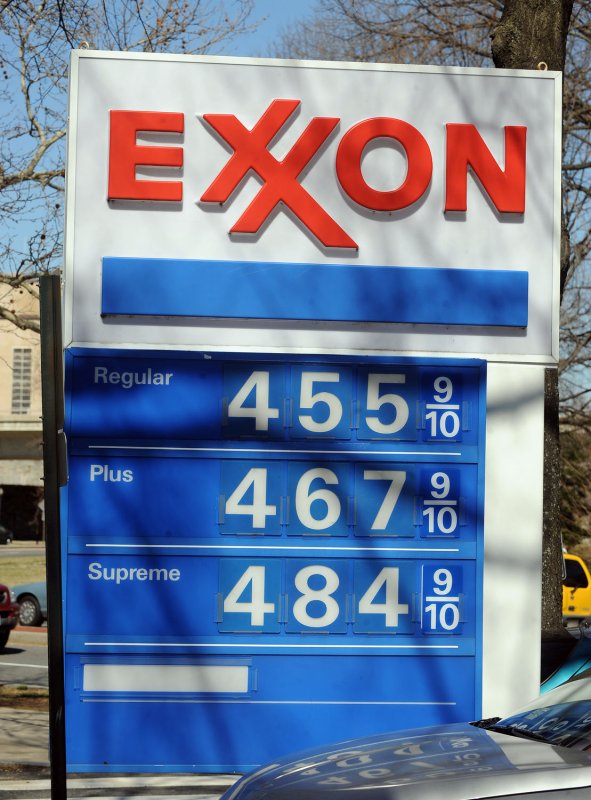Iraqi Prime Minister Nouri al-Maliki is stepping up the pressure on Exxon Mobil to back off a breakaway oil exploration deal with the Kurds' semi-autonomous enclave and the betting is the world's largest oil company will fold.UPI/Roger L. Wollenberg. |
License Photo
BAGHDAD, Dec. 7 (UPI) -- Iraqi Prime Minister Nouri al-Maliki is stepping up the pressure on Exxon Mobil to back off a breakaway oil exploration deal with the Kurds' semi-autonomous enclave and the betting is the world's largest oil company will fold.
Exxon's October surprise agreement with the Kurdish Regional Government to explore six fields within Kurdish territory, the first by an oil major, triggered a crisis in Iraq.
It challenged the authority of Maliki's shaky Shiite-dominated coalition at a critical time as U.S. troops are pulling out and his insistence that his government controls all oil contracts in the country.
The U.S. oil giant's deal with the independence-minded Kurds bolsters encouraged momentum for greater autonomy by other regions as U.S. forces near the Dec. 31 deadline to complete with their withdrawal.
"The federal government will continue to escalate pressures against Exxon, partly because opposing Kurdish initiative is politically useful for Maliki in his efforts to court Arab nationalist support," Oxford Analytica said in an analysis Tuesday.
"Exxon will most likely withdraw from the Kurdish deal in a low-profile retreat … The United States government may also bring additional pressure."
The government is locked in a long-running feud with the KRG over land rights and oil revenue sharing.
Baghdad has banned all oil and gas contracts with the Kurds, who have the only semi-autonomous region in the country.
That's a holdover from the aftermath of the 1991 Gulf War when the United States and Britain guaranteed the protection of the Kurdish enclave from Saddam Hussein's efforts to crush a Kurdish revolt.
Iraqi Kurdistan sits atop some 45 billion barrels of oil and offers better incentives than the federal government. Iraq's national oil reserves stand at 143.1 billion barrels.
From a political standpoint, Maliki cannot afford to allow Exxon Mobil to start drilling in Kurdistan, which spans three northern provinces, without appearing weak to other regions and to political opponents, such as the minority Sunnis.
Baghdad has already threatened to withdraw Exxon Mobil's 2009 contract to develop the giant West Qurna field in southern Iraq which contains an estimated 8.7 billion barrels of oil.
This is one of the key development projects in Iraq's drive to quadruple its oil production to 10 million-12 million barrels per day by 2017 and it remains to be seen whether Baghdad is prepared to put its money where its mouth is and jeopardize that vital project.
Exxon is also the leader in a $10 billion project in Basra, the southern oil capital, for injecting seawater into the southern fields to boost pressure to push the oil out.
"In these two projects alone, Exxon will manage an estimated $60 billion worth of infrastructure investment," Oxford Analytica observed.
"Given this level of involvement, a deterioration in relations between the federal government and Exxon could have serious consequences for Iraq's oil export levels and economic growth."
In November, Baghdad banned Exxon from a fourth licensing round for oil and gas contracts scheduled for January. That was generally seen as little more than a symbolic gesture since Exxon has shown little interest in the blocks up for auction.
Oxford Analytica observed that Exxon may have gambled on Baghdad and the KRG reaching agreement "in the near future" on a compromise version of the Oil Law, first proposed in 2007.
But that prospect seems as remote as ever amid a fractious Parliament and the interminable wrangling between the federal government and the Kurds.
"Maliki has failed to deliver on promises he made to the Kurdish authorities in return for their agreement to his reappointment as prime minister" following the inconclusive March 2010 parliamentary election," Oxford Analytica said.
On Nov. 21, Iraqi officials said Maliki's government could replace Exxon Mobil with Royal Dutch Shell on the West Qurna project if the U.S. giant refuses to repudiate the KRG deal.
That would mark a sharp escalation in tension between Exxon Mobil and Baghdad.
Shell, which is already a partner with Exxon Mobil in West Qurna, had been in talks with the KRG for exploration deals on three blocks in Kurdistan. But, fearful of losing West Qurna and other potential government contracts, it pulled out after the Exxon Mobil deal with the KRG became public Nov. 13.
Several days later, Shell signed a breakthrough $17 billion natural gas deal with Baghdad.















